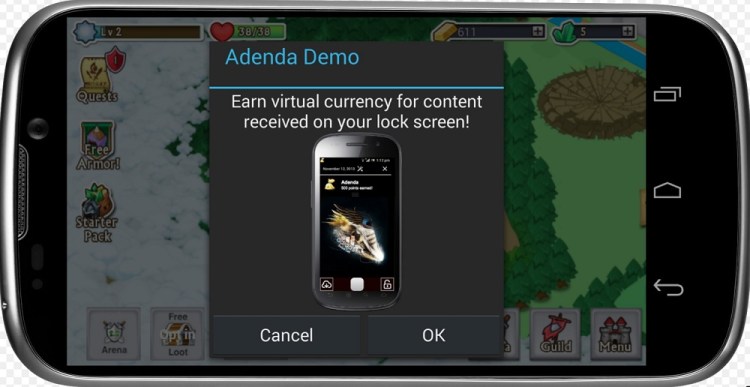The lock screen on your Android smartphone stops you from making embarrassing pocket-dial calls. But one startup wants to make it more useful by sending animations and other notifications to it from games and other apps.
Vancouver, Canada-based Adenda has created a tool that gives mobile apps access to the lock screen, which is normally used to display text notifications. But Adenda’s tool can send rich media, ads, animations, or other content. It is one more tool that can keep users engaged, but it can also be used for advertising to better monetize an app.
Game companies can use the tool to draw users back into a game with a notification. That notification can be an animation that shows a village in your game burning down after an enemy attack, said Francis Doumet, chief executive of Adenda, said in an interview with GamesBeat.
“If a user hasn’t played in a week, it can show you an animation of the consequences so that the user comes back,” Doumet said. “In our case, you can take advantage of the whole screen, all of the real estate, for a specific purpose.”
The lock screen is part of the Android system software that carries restrictions. To enable the Adenda feature, a user has to give his consent to the app before it accesses the lock screen. If the user gives that consent once, the app can send messages or animations. And if the user turns it off again, then the app can no longer access the lock screen.
“Users only turn this feature on if they want to,” Doumet said.
The beauty of Adenda’s feature is that it is easy for the user, he said. If you see an animation pop up on the lock screen, you can swipe right to get rid of it and return to the phone’s home screen. Or, if you want to engage with the app, you swipe left. Then the ad will run, or the game will load.
The feature is ideal for game companies that don’t want to put ads inside their app because they would ruin the game experience. But the so-called “out-of-app” ads that could be created for the lock screen are less intrusive. That would enable game companies to monetize games via ads that wouldn’t otherwise run.
Adenda has three employees, and it was founded last year. It has raised a few hundred thousand dollars to date from private investors. Rivals include Locket and Widdit. Adenda lets apps autonomously modify the lock screen content on the fly. It also has a reward loop built into it to reward users who periodically enable the app’s lock screen.
Facebook’s Home mobile app can also display Facebook notifications on an Android lock screen. And Twitter recently bought lock screen startup Cover. Adenda’s software doesn’t work with iOS yet, as Apple has a more complex process for accessing the lock screen.
Adenda is live with one mobile game now, and about 10 percent of users have turned on the app’s custom lock screen. Doumet said nongame app makers have also contacted the company in hopes of using the feature.
VentureBeat's mission is to be a digital town square for technical decision-makers to gain knowledge about transformative enterprise technology and transact. Learn More

